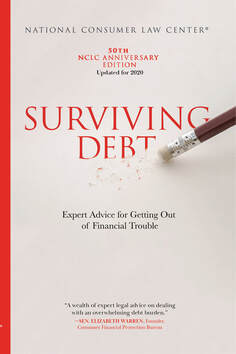
The heroes at the National Consumer Law Center (NCLC.org) have made their comprehensive 50th Anniversary guide for debtors called “Surviving Debt” available at no charge for ANYONE.
This is an outstanding resource for ordinary folks who don’t want to try to read law books or statutes etc. It’s in clear, plain English. I have given away more than two dozen copies to friends and clients and it’s usually the first book I reach for when someone has a question about how to manage their debts of ANY kind.
While you isolate in place, if you are worried at all about your finances, take the time to read the first 10 short chapters and then the chapters for your type of debts. So you don't have to read it all -- just the first couple chapters and then the chapters that pertain to your type of problem.
(And if you yourself are able to make a contribution to NCLC, they would welcome it and put it to good use.)
Find it here: https://library.nclc.org/SD
- Chapters
- Glossary
- Chapter 1 Six Essential Rules for Surviving Debt
- Chapter 2 Responding to Debt Collectors
- Chapter 3 What You Need to Know About Your Credit Report
- Chapter 4 Collection Lawsuits
- Chapter 5 Taking Out New Loans to Pay for Old Debts
- Chapter 6 Reverse Mortgages
- Chapter 7 Choices to Avoid at All Costs
- Chapter 8 Reducing Your Expenses
- Chapter 9 Options for Increasing Your Income
- Chapter 10 Keeping Track of Income, Expenses, and Debt
- Chapter 11 Medical Debt
- Chapter 12 Credit Card Debt
- Chapter 13 Student Loans
- Chapter 14 Car Loans and Repossessions
- Chapter 15 Utility Terminations
- Chapter 16 What Every Homeowner Should Know About Mortgage Payments
- Chapter 17 When You Are Having Trouble Making Mortgage Payments
- Chapter 18 Defending Your Home from Foreclosure
- Chapter 19 Property Taxes and Tax Sales
- Chapter 20 Evictions and Getting Out of a Lease
- Chapter 21 Civil Court Judgment Debt
- Chapter 22 Debts Related to Criminal Law
- Chapter 23 Federal Income Tax Debt
- Chapter 24 Deciding Whether and When to File Bankruptcy
- Chapter 25 How the Bankruptcy Process Works
 RSS Feed
RSS Feed
